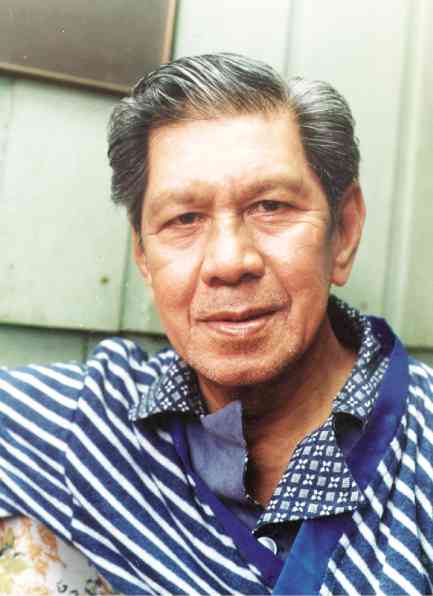Quijano de Manila: A centennial tribute to Nick Joaquin
(In celebration of the birth centenary of National Artist for Literature, Nicomedes Márquez Joaquín, 1917 to 2004)
My first encounter with the great writer Nick Joaquin was through a book compilation of his thought-provoking essays entitled Culture and History. In all honesty, I was slightly turned off by what I perceived as his Hispanophilia. His essay, “A Heritage of Smallness,” was a scathing but unjust rebuke of what he perceived as the Filipino penchant for the “tingi,” for the small, for the “bangka” instead of seafaring Galleons or the English ships that crossed the Atlantic. Of course, he never knew that our balangay travelled across seas and oceans. Nick Joaquin was a product of his time, and great writers of the past are often misjudged by the lens of our time, a crime of anachronism if you will.
Joaquin loved to deconstruct accepted conventions. His A Question of Heroes sort of traumatized me and at the same time balanced my views. He laid doubt and suspicion on every Filipino historical figure we adore to a fault, and in so doing humanized these heroes in a way that still surprises. For all our heroes are but flawed human beings, just like us.
Article continues after this advertisementBut Quijano de Manila (his surname) soared in my imagination through the years–in my personal quest of reading anything and everything Philippine Literature in English. I never knew that I would fall in love with his style… his lengthy and vivid sentences that seemed to have no end, as if he was writing in English with a pulsating heart of a Filipino and sentimental musings of the Spanish. Sentences in Spanish were indeed normally lengthy.
For example, just look at this lengthy sentence–the first paragraph to his famous and poignant short story, May Day Eve:
The old people had ordered that the dancing should stop at ten o’clock but it was almost midnight before the carriages came filing up the departing guests, while the girls who were staying were promptly herded upstairs to the bedrooms, the young men gathering around to wish them a good night and lamenting their ascent with mock signs and moaning, proclaiming themselves disconsolate but straightway going off to finish the punch and the brandy though they were quite drunk already and simply bursting with wild spirits, merriment, arrogance and audacity, for they were young bucks newly arrived from Europe; the ball had been in their honor; and they had waltzed and polka-ed and bragged and swaggered and flirted all night and where in no mood to sleep yet–no, caramba, not on this moist tropic eve! not on this mystic May eve! –with the night still young and so seductive that it was madness not to go out, not to go forth—and serenade the neighbors! cried one; and swim in the Pasig! cried another; and gather fireflies! cried a third—whereupon there arose a great clamor for coats and capes, for hats and canes, and they were a couple of street-lamps flickered and a last carriage rattled away upon the cobbles while the blind black houses muttered hush-hush, their tile roofs looming like sinister chessboards against a wile sky murky with clouds, save where an evil young moon prowled about in a corner or where a murderous wind whirled, whistling and whining, smelling now of the sea and now of the summer orchards and wafting unbearable childhood fragrances or ripe guavas to the young men trooping so uproariously down the street that the girls who were desiring upstairs in the bedrooms catered screaming to the windows, crowded giggling at the windows, but were soon sighing amorously over those young men bawling below; over those wicked young men and their handsome apparel, their proud flashing eyes, and their elegant mustaches so black and vivid in the moonlight that the girls were quite ravished with love, and began crying to one another how carefree were men but how awful to be a girl and what a horrid, horrid world it was, till old Anastasia plucked them off by the ear or the pigtail and chases them off to bed—while from up the street came the clackety-clack of the watchman’s boots on the cobble and the clang-clang of his lantern against his knee, and the mighty roll of his great voice booming through the night, “Guardia serno-o-o! A las doce han dado-o-o.”
One could perceive that he pauses shortly but almost without breath, as if the vividness and the ordinariness of the environment he described could not wait to be put on paper. English language was, after all, just a utilitarian language to him. It’s as if English wasn’t enough to convey what he wanted to say. Perhaps because he wrote in fluent Spanish, and he lived in an era where the new American and the old Spanish influences clashed seeking for supremacy in the Philippines. His unique literary mark gave his pen the feel of an old soul familiar to all Filipinos.
Article continues after this advertisementHis style also gave credence to proto-Filipino literature, one that hints of certain elements of pre-colonial folk tradition fused with Catholic embellishments and meaning.
Continue reading at Indio:Bravo//.
ThINQ is the Inquirer's attempt to highlight in the public space the distinct viewpoints contributed by bloggers covering a wide range of topics and issues.
If you'd like to be included in the ThINQ blogger network, e-mail [email protected] with the subject "ThINQ Membership" along with your blog's URL and topics your blog currently covers.

















